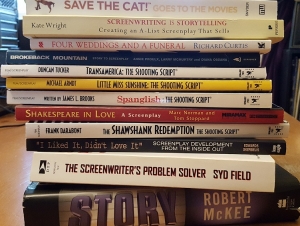Screenwriting Tips That Work for Authors of Books
by Renée J. Lukas
In this series, I’m focusing on screenwriting tips that also work for writing novels.
 Tip #3
Tip #3
Your protagonist doesn’t necessarily have to be likable. But it helps if she’s relatable. What? That can’t be! You’ve followed the screenwriting commandments that have been drummed into your head for so long, especially: “Thou shalt not have a protagonist whom everyone hates.”
The idea is that if we don’t like the main character, we won’t want to spend two hours—or a whole book—with her or him.
There’s just one problem with that theory. It isn’t true.
Think about all of the unlikable characters you’ve met in stories who left you riveted and wanting more. For example, Frank Underwood in House of Cards has proven himself to be a pretty despicable character. But at the beginning, Frank is passed over for a job he was promised. Many of us can relate to that, so it creates an immediate sense of empathy. As time goes on, of course, you’re compelled to see how far he’s willing to go to right the wrongs against him.
In Sharp Objects, a novel by Gillian Flynn (Gone Girl), the protagonist was hard for me to relate to. The story is told in first person, which creates a more up close and personal tone. This can be problematic if you don’t like—or feel indifferent to—the protagonist. This character makes a lot of questionable choices—about casual sex and physically harming herself—so hers is not a viewpoint I can really empathize with. Correction: I felt bad that her mother was such a weirdo, and I realize this affected her psyche quite a bit. But I still felt a distance as I was reading it. This begs the question: what made me keep on reading? In the case of Sharp Objects, I turned the pages to find out who the killer was. Plain and simple.
So, in addition to empathy, throw in a fascinating situation for the backdrop, and this alone may be enough to hold your audience’s interest. But be warned: interesting circumstances may NOT be enough to hold readers’ interest if they can’t find anything redeemable about your main character.
It helps to make her or him someone we can, at the very least, understand, even if we don’t agree with the choices they make.
For example, we may never DO what the character does, but can we understand WHY she did what she did? I’d never leave my child in a park for someone to find (God Bless the Child), or become a prostitute working up and down Florida highways (Monster). But in both cases, the women were desperate, and you can imagine how they reached the unthinkable when their options became more and more limited.
How do you create empathy?
Use universal themes. In both examples I mentioned, we may have also experienced the same feelings that the characters do. Frank Underwood—feeling like an outsider, the last one to know he didn’t get the job. Feeling betrayed by someone, wanting something so much. . . only to lose it. Falling in love is a major universal motivator. After all, how many of us have done stupid things for love? Other universal concepts: fearing death or harm, protecting a loved one, envying someone, wanting revenge, etc. These are all good reasons to make us care about difficult characters.
The Hannibal Lecter Question
Inevitably, there are characters who seem to be exceptions to the rule. This is the case with Hannibal Lecter in Silence of the Lambs. Unless you go around eating people on a regular basis, you would find him impossible to relate to. This is an exception, and it takes great skill to achieve the same response that audiences had with Hannibal. Yes, he’s a serial killer. And he kills in a most gruesome way. So, how do you make him someone an audience wants to get to know better?
The use of humor. Even with all his killing, Hannibal is funny. He makes jokes as he’s being creepy. To Detective Starling, who keeps visiting him: “People will say we’re in love.” Or the classic line: “I’m having an old friend for dinner.”
Creating something unexpected. There is a real dichotomy between the bloody slaughter of a security guard and Hannibal, taking time out from murdering to appreciate a moment of classical music. This unexpected layer creates more interest than just turning him into a one-dimensional killing machine. A cannibal who appreciates the arts? Who does great sketches that get splattered with blood when he kills? What is THAT about? That is the difference between writing a cliché character and a complex, interesting one. Remember, contradictions are your friends.
Human nature. Our fascination with the dark side keeps us reading crime stories and murder mysteries—well, some of us. We can’t help ourselves. It’s the reason your head turns when there’s a car wreck on the side of the road. It may not be the best side of human nature, but there it is. And it’s what compels us to watch—and be fascinated by—“the bad guys” in many stories.
So if you’re writing a horror story, try not to get so carried away in the blood and guts and body count that you leave us with a loathsome character we don’t want to spend any time with. At the same time, you needn’t go out of your way to make your protagonist the life of the party or the girl who gets all of her Girl Scouts’ badges. As I’ve said before, deeply flawed characters are the most interesting. As long as we can relate to something about the character, or the character is fascinating even if dark, we’ll be willing to go on the ride with you.




